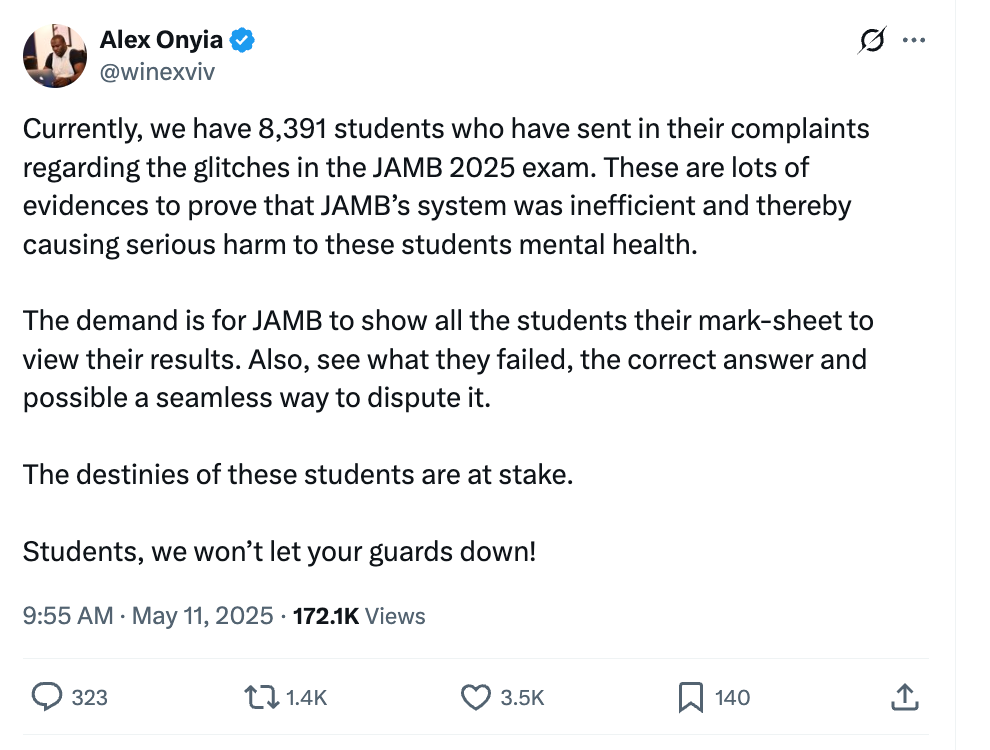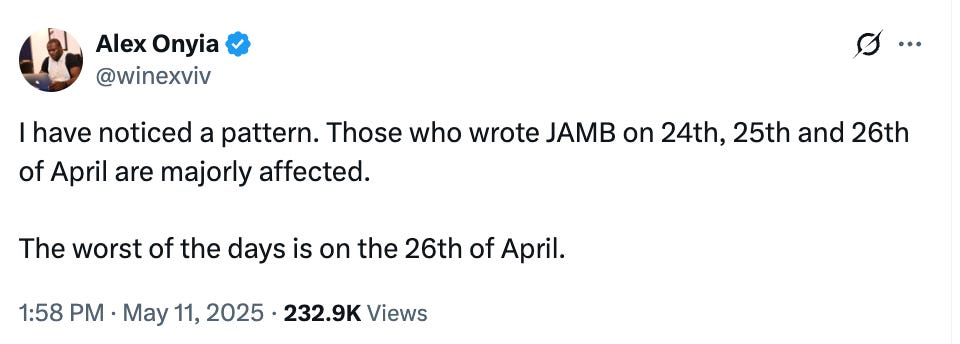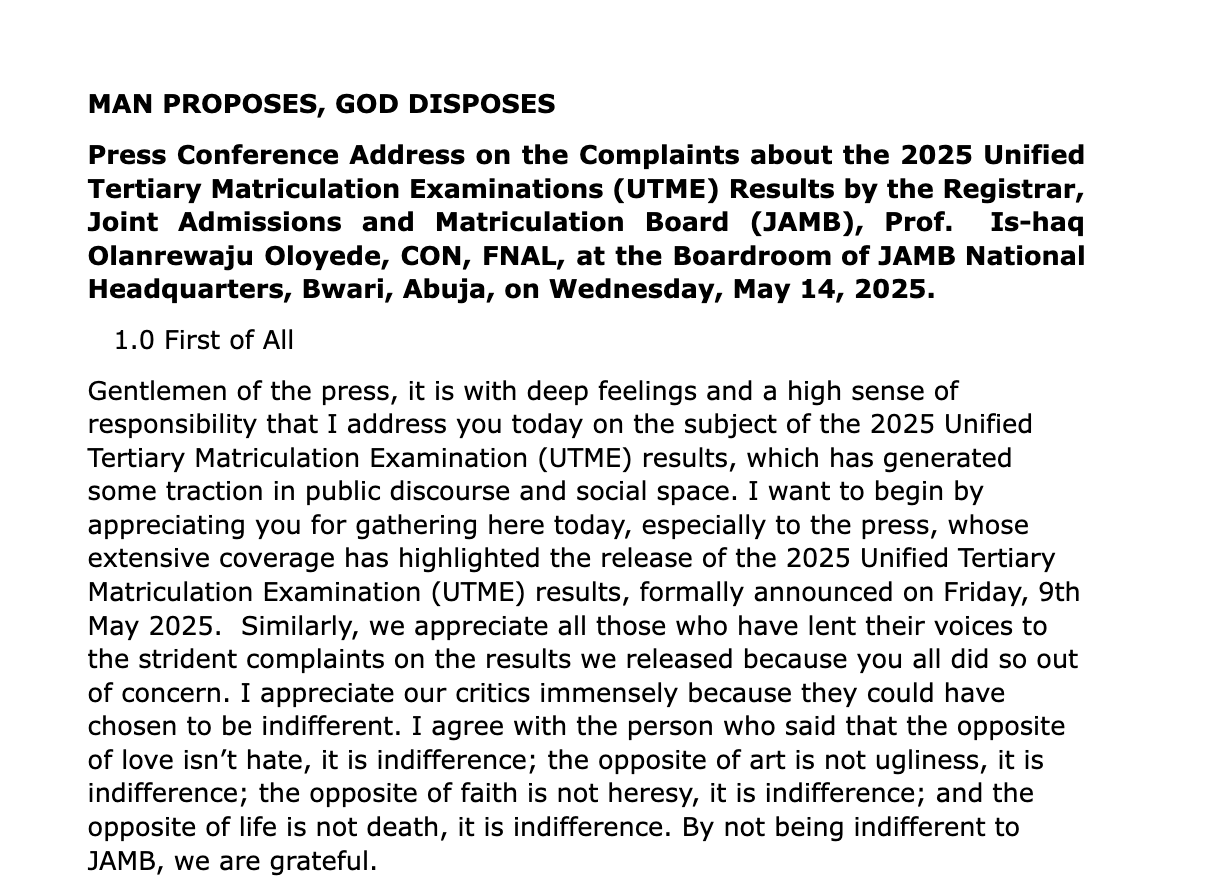JAMB, A Cultural Lack Of Accountability And The Anatomy Of Educational Policy Failure In Nigeria
"Why are you asking me to resign, shebi I already said sorry"
The beginning
For the average Nigerian, the lack of expectations from our government is deeply rooted in decades of unfulfilled promises, persistent infrastructure failures, and a political culture that has normalized the abdication of basic state responsibilities. Despite repeated campaign pledges since the return to democracy in 1999, successive administrations have consistently failed to deliver on stable electricity, potable water, security, and timely payment of salaries and pensions. For instance, reliable electricity remains elusive for most Nigerians: only 13% of the population report having power that works “most” or “all of the time,” and 80% rate the government’s performance on electricity provision as poor 1.
Sadly, this widespread dissatisfaction has not translated into robust expectations for government accountability; rather, it has resulted in a fusion of self-reliance and resignation, where basic amenities are seen as personal responsibilities rather than state obligations. Nigerian politicians have learned to exploit this peculiar dynamic during election cycles, making campaign promises about salary payments, pensions, and road construction. Services that, in functional (first world) democracies, are considered baseline government duties.
In actual fact, our politicians have performed successful classical conditioning experiments on us and it worked.
You may begin to wonder why I’m providing this background in an article that is supposed to focus on Joint Admissions and Matriculations Board (JAMB) and its policy failures in Nigeria. The reason is simple: to truly grasp the significance of these failures, it’s important to first understand that we Nigerians (as a people and culture) have learned to expect only the barest minimum from our government. At the very least, when the nation’s youth—the so-called “leaders of tomorrow”, sit for exams that will shape their futures, determine their courses of study, and decide which universities they can attend, they expect their results to fairly reflect their efforts. They need to trust that their scores are accurate. But it seems that even this modest expectation is now too much to ask.
JAMB
JAMB is the body responsible for setting standards and conducting the entrance exam known as the Unified Tertiary Matriculation Examination (UTME) for secondary school students in Nigeria. This exam is the gateway to universities, polytechnics, and colleges of education across the country. Depending on the institution, students may also be required to take an additional test called the post-UTME.
The UTME is a standardized exam, written once a year, with a total score of 400. While it is logical to assume that the pass mark would be 200, it is not (but that’s a discussion for another day). Traditionally, the exam was paper-based: students would shade answers with HB pencils, and the sheets would be marked. However, in 2013, the government introduced a computer-based test (CBT) version, which became fully implemented nationwide by 20152. The rationale behind this shift (despite Nigeria’s well-known challenges with electricity) was that CBT would speed up marking, reduce examination malpractice and errors.
Well, quite predictably, things haven’t gone exactly like that.
UTME 2025. How did we get here?
For the 2025 UTME exam, registration closed on March 8th with approximately 2,030,627 candidates. The examinations took place from 24th of April to 5th of May, 2025. Even before the exams began, there were early signs of potential problems. The official timetable required some candidates to arrive at their exam centers as early as 6:30 AM.
To put this in perspective, the average age of a JAMB candidate is 16 years, and a number of exam centers were situated far from students’ homes. Transportation is often difficult, and safety (in today’s Nigeria) cannot be taken for granted. And as you can imagine, the stress and disruption caused by such early reporting times are significant, especially for teenagers facing one of the most important exams of their lives. Yet, in our true Nigerian fashion, despite these advertised arrival times, the exams still started late at several centers, exerting another layer of frustration on the poor candidates. When the exams finally ended (despite the widespread complaints), the release of results was scheduled for May 5.
But how did JAMB respond to complaints, even before the results were released? Instead of addressing the genuine concerns raised by candidates, parents, and educators, the institution took a different approach:
JAMB (or their social media manager) spent valuable time on Twitter "clapping back" at Peter Obi, a former presidential candidate, in a post that ultimately earned a community note for misinformation 3.
On April 29th, JAMB shared a Google Doc “article,” clearly generated by ChatGPT and attributed to someone named Timothy Odedina, with the sole purpose of dismissing the concerns and incidents reported during the exam period 4.
On May 5th, JAMB released an analysis of the 2025 UTME results, stating that there was a significant failure rate and that only 0.4% of candidates scored above 300 5.
Finally, on May 9th, 2025, JAMB officially released the results.
Initially, after reviewing JAMB’s analysis, I genuinely thought the high failure rate was primarily due to increased distractions (especially from mobile phones), poor teaching methods, and chronic underfunding of the Nigerian education system. However, I now partially retract that view. While internet distractions and inadequate teaching and funding undeniably contribute to Nigeria’s struggling educational landscape, I underestimated the impact of the Nigerian “anyhowness” factor (an ingrained culture of carelessness and lack of accountability) on the examination statistics released by JAMB.
After the results came out, some intriguing patterns emerged. Some students who had consistently scored exceptionally well in previous years (often above 300) were now reported to have failed in 2025. In a typical year, when mistakes like this occur, the response is usually a mix of complaints and resignation, with many believing that fate/god/destiny was responsible for their misfortune. But this year was different, thanks to the emergence of a major character in our story.
Enter: Alex Onyia
LinkedIn describes Alex Onyia as a graduate of the University of Nigeria, Nsukka, and the CEO of Educare (a leading K-12 education technology platform in Africa). Confronted with widespread complaints about technical glitches and inexplicably low scores in the UTME, Alex began to leverage his large following and expertise to organize a collective response.
Firstly, he started by using social media to crowdsource and document cases from affected students, ultimately compiling a database of 8,391 candidates who reported issues with their exam scores. This data-driven approach allowed him to quantify the scale of the problem, providing a solid foundation for further action.
Alex then amplified the issue through mainstream media, appearing on TVC, to discuss the mass failures and highlight the technical and procedural irregularities that marred the exam. He also developed and publicly shared his hypothesis about the patterns of these failures, suggesting that the glitches were systemic rather than isolated incidents.
Most importantly, Onyia escalated the matter by taking “legal steps” against JAMB, seeking judicial intervention to compel the exam body to release detailed mark sheets for all affected candidates and provide transparency on the scoring process. This push was grounded in the evidence he had gathered so far and was intended to ensure that students could verify their results and dispute errors where necessary.
The mounting social, media, and legal pressure led JAMB to formally invite Onyia (on 13th of May) to participate in a transparent review of the 2025 UTME. He was asked to join a panel tasked with appraising the conduct of the examination, and identify challenges.
Irreversible consequences are truly irreversible
While all of this was unfolding, the poor Nigerian students who took these exams were already beginning to suffer the consequences. Opesusi Faith Timilehin, a 19-year-old girl living in Odogunyan, Ikorodu, Lagos with her elder sibling, was among them. After receiving a disappointing score of 190 out of 400, she ingested rodent poison and took her own life 6. Timilehin had reportedly passed the UTME the previous year, and the mental strain of failing an exam she had once succeeded in proved too much for her to bear.
Given the numerous issues that have already been identified with the examination process so far, is it really so far-fetched to consider that Timilehin might have received an incorrect result? And if so, is it unreasonable to hold JAMB at least partially responsible for her untimely death?
Oloyede becomes a crocodile
In a display that was as comical as it was tragically embarrassing, JAMB finally convened a press conference on May 14, 2025, led by its Registrar, Prof. Is-haq Olanrewaju Oloyede, in Bwari, Abuja. Rather than accept responsibility for a failure of this magnitude (as would be expected in other countries) an apparently overwhelmed Oloyede chose not to resign. Instead, he shed a few crocodile tears 7 and delivered a speech (in classic Nigerian fashion) titled “Man Proposes, God Disposes.”
One might be tempted to think that the supernatural had taken over the role of the JAMB Registrar and only the supernatural is to blame for this colossal debacle.
Despite the gravity of the situation ( and at the time of writing), Oloyede continues to evade accountability, deflecting blame onto a higher power rather than addressing his own incompetence. The tragedy that has unfolded under his watch has been met not with responsibility, but with excuses.
JAMB now claims to have identified a “technical error” affecting 157 centers nationwide, particularly in the Lagos and Owerri zones, with approximately 379,997 candidates impacted. In a move even more inconsiderate and callous, the body is proposing that these affected candidates retake the exams—beginning May 16, 2025, giving them merely two days to prepare 8.
The end: Turning and turning in the widening gyre, the falcon cannot hear the falconer
Nigeria is a deeply fragmented country, divided along ethnic, tribal, and religious lines. In recent years, tribalism and discrimination among its various groups have intensified, largely due to political factors. One clear implication of JAMB’s incompetence (beyond the tragic loss of life it has already caused) is the acceleration of distrust amongst all of our tribes, and the further fragmentation of our national fabric.
Following JAMB’s admission of its failures, and considering that a significant portion of those affected (173,387 candidates) are from Owerri in the South East, influential voices in the East have begun to question whether the sabotage was deliberate and targeted at the Igbo people 9.
While these suspicions might seem exaggerated (especially given an even larger number of affected candidates [206,610] are from Lagos in the South West) it is very apparent to me why such doubts arise and why deep divisions and suspicions among us will only continue to grow.
Ultimately, the blame for this crisis should rest squarely on the shoulders of Prof. Oloyede, who has refused to resign and may yet oversee the next round of examinations in 2026. The persistent lack of accountability, the prevalence of incompetence, and the absence of excellence in public policy will only continue to deepen Nigeria’s woes, exposing our already fragile society to further cracks.
I rest my case.
REFERENCES
Dispatch, A., 814, N., Maame, Twum, A. & Beecham, E. Nigerians lack reliable electricity, leaving most discontent with government’s efforts. https://www.afrobarometer.org/wp-content/uploads/2024/06/AD814-Nigerians-lack-reliable-electricity-Afrobarometer-19june24.pdf (2024).
Akintayo Eribake. 1.4m candidates for 2015 JAMB. Vanguard News https://www.vanguardngr.com/2015/01/1-4m-candidates-2015-jamb/ (2015).
X (formerly Twitter) https://x.com/JAMBHQ/status/1916565144957575305 (2025).
Adesina.docx, T. Timothy Adesina.docx. Google Docs https://docs.google.com/document/d/1OumAiTlEunPk1vWbwOrNsQ-puNucO967/edit?tab=t.0#heading=h.iv4ov5uzygai (2019).
2025 UTME Result Analysis.docx. 2025 UTME Result Analysis.docx. Google Docs https://docs.google.com/document/d/1AFM8B9Ip00ffQlK7PPPUA1Xq-WWxAz9n/edit?tab=t.0 (2025).
Jimisayo Opanuga. UTME: 19-yr-old commits suicide over ‘low score’, gets admission notice 30 minutes later. The Guardian Nigeria News - Nigeria and World News https://guardian.ng/news/nigeria/metro/utme-19-yr-old-commits-suicide-over-low-score-gets-admission-notice-30-minutes-later/ (2025).
X (formerly Twitter) https://x.com/ARISEtv/status/1922676757787766804 (2025).
Suleiman, Q. UPDATED: UTME 2025: JAMB admits errors in results, over 370,000 candidates to retake exam. Premium Times Nigeria https://www.premiumtimesng.com/news/headlines/794255-updated-utme-2025-jamb-admits-errors-in-results-over-370000-candidates-to-retake-exam.html (2025).
ASUU threatens to sue JAMB over UTME mass failure. Punchng.com https://punchng.com/asuu-threatens-to-sue-jamb-over-utme-mass-failure/ (2025).












